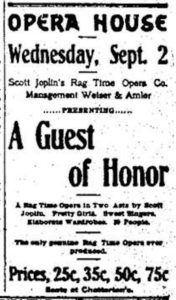
Opera Profile: Scott Joplin’s ‘A Guest of Honor’
By John Vandevert“A Guest of Honor“ was ragtime composer Scott Joplin’s first of two opera, whose plot was based on the historical events surrounding President Theodore Roosevelt and his invitation of advisor Booker T. Washington to dinner at the White House with his wife in October of 1901.
Joplin’s “grand opera” has a short but complex history, with much of what is known based on conjecture and posthumous statements from documents and related family members. It is speculated that Joplin began to work on the opera shortly after learning of the 1901 events, Joplin an avid reader of the Indianapolis Freeman, an African-American publication focused on community-specific topics. In fact, the title of the opera was potentially derived from a 1901 editorial which uses the same phrase, “A Guest of Honor,” in reference to Washington. Little is known about the opera until February 16th of 1903, when Joplin filed for copyright, although no score was attached to his application. He listed Stark (in reference to John Stillwell Stark) as the publisher, although the opera never received formal publication. Flash to April, and based on an article by Monroe Rosenfeld of the St. Louis Globe-Democrat, it was clear the opera was well on its way to becoming an audience favorite. Rosenfeld also noted the opera’s popularity among donors and Joplin’s financial assistance at the time.
In order to popularize the opera, Joplin set up a touring company called the “Scott Joplin’s Ragtime Opera Company” (although sometimes referred to as a minstrel company), their first performance slated for August 30th of 1903. They were scheduled to perform in 15 venues across the American midwest, although it is unclear how many performances actually took place. Things would start to go south quickly, however, as it’s recorded that someone in the company managed to steal office receipts (i.e., money). As a result, Joplin had found it hard to finance the company’s lodgings, and it’s speculated that the score was taken as payment.
The company would later break up, and it was noted that the tour was a resounding financial failure for Joplin. Nevertheless, he would later travel to New York in 1907 to try and secure funding and a publisher for the opera, but this seemed to fail as well. As ragtime scholar Edward Berlin noted, from 1907 onward Joplin rarely brought up “A Guest of Honor,” instead focusing on his second opera, “Treemonisha (1911).” In his words:
“I have not discovered a single reference to the opera after 1903. Whereas from 1907 on, Joplin rarely missed an opportunity to mention he was working on an opera (which was to be Treemonisha), or, from 1911, that he had completed it, he never cites it as his second opera. It is as if he wanted to pretend ‘A Guest of Honor’ had never existed.”
There is no known copy of the score, and it is assumed to be lost. Researchers, who made contact with Stark’s son, William P. Stark, confirmed suspicions on the opera’s missing status with his response, “While ‘A Guest of Honor’ had some pretty good music, the story and lyrics were weak, and it was never published.”
Categories
Opera Wiki

